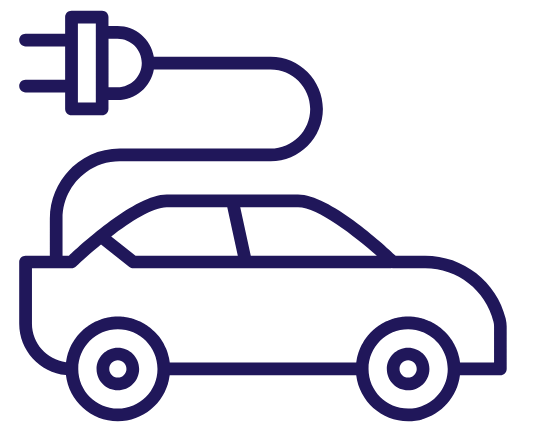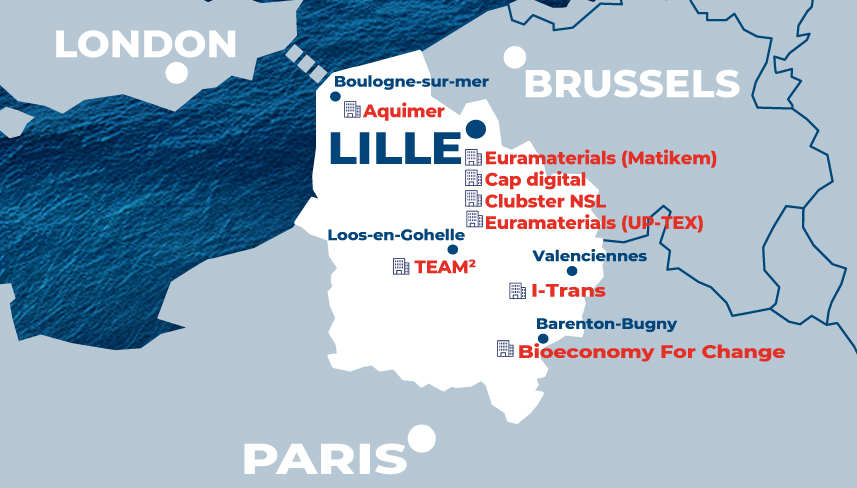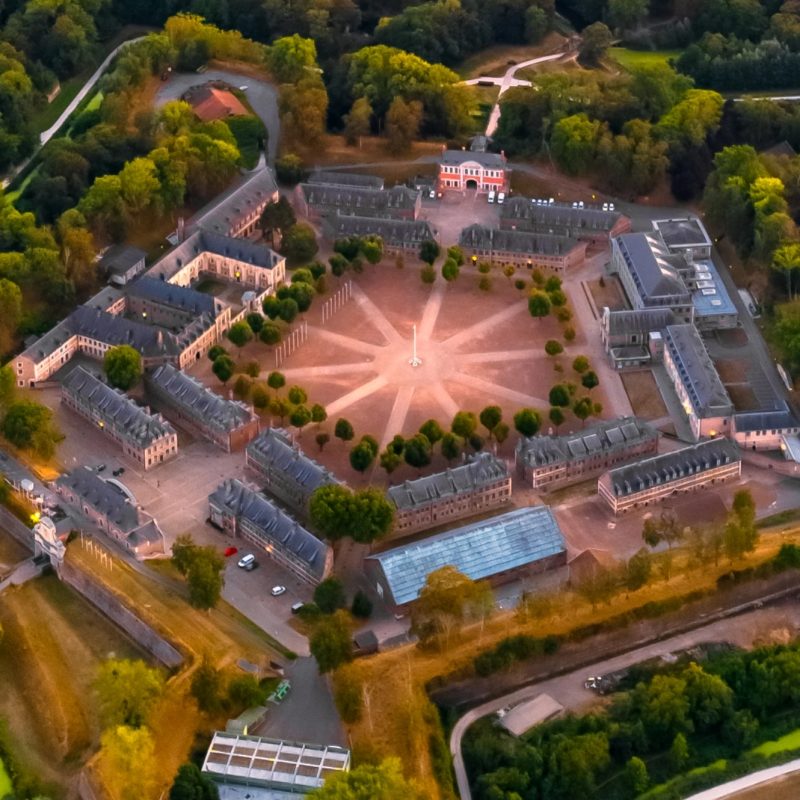France’s position in the European market
France is a world leader in major industries
France is a powerhouse in numerous growing sectors:
- Since 2020, France has been the world’s 6th largest exporter of agricultural and agrifood products, with a global market share of 4.3% – putting it ahead of Italy (3.6%) and Canada (3.1%).29
- Technology: France is a major player in new technologies, with one of the French government’s priority sectors undoubtedly being artificial intelligence (AI). France invests more in AI than any other European country. It also has the 3rd highest number of AI researchers in the world. 31
- Automotive: The battery sector is booming in France due to a government initiative to support the sector. So far, 6 gigafactories are going to be set up in France and 40 battery-related ventures are being supported under the France 2030 programme (which represents €2.1 billion in financial incentives and €8.2 billion in investment). 32
- The health sector: €90 billion in turnover was generated in France in 2023 by the +3,100 life science companies that base their operations here. 33
- The luxury sector: France remains the world leader in fashion and luxury goods, with 130 of the world’s 270 luxury brands being French. 34
Many of these sectors can be found in Hauts-de-France, which is the leading region in France for automotive companies, the 3rd best-performing region for agrifood companies, as well as being home to major logistics companies.
29 France Agrimer 2024
30 Atout France
Why Hauts-de-France attracts foreign companies
For the 6th consecutive year, France was the leading European country for foreign development and investment projects in 2024.8 Hauts-de-France was the region that saw the 2nd highest number of jobs created through foreign direct investment, and the 3rd highest number of projects. Overall, we came 8th in Europe in terms of the number of projects launched on the back of foreign direct investments.
8 EY 2025
10 Reuters
11 RFI

HHow is “Made in France” perceived in Europe and around the world?
The Made in France label is seen as a sign of quality and is well perceived worldwide. The Made-In-Country Index awarded France an index of 81/1001 in 2017. Only products and merchandise that have been produced in France and that meet demanding standards can carry this trademark.
Usleep is a good example of the weight this label carries. They chose to expand their manufacturing plant in Dourges in Hauts-de-France specifically so that they could obtain the Made in France label.
According to Luciano Biondo, former president of Toyota Motor Manufacturing France:
“Our salespeople say it [the Made in France label] makes a big difference. A car’s origin is often third or fourth on the list of priorities for customers, and French-made vehicles carry a lot of clout—especially in the domestic market.”
Source : 1 Satista
Expanding into France
Establishing a business in France is easier with the right partner. By forging a partnership with an investment promotion agency, you can greatly simplify the process. Nord France Invest are the people to speak to about setting up in the Hauts-de-France region, while Hello Lille are the agency for the Greater Lille area.
There are five administrative formalities to setting up a business in France:
- Choose the right business structure
- Draft an “annonce légale”, an official French document that announces the creation of your business
- Choose the correct legal form and draw up your memorandum and articles of association
- Deposit share capital in a bank account
- Register your business with the “guichet des formalités des entreprises”, the French equivalent of Companies House

Need tailored support to set up in France?
Investment promotion agencies are staffed with people who are experts in their regional economy. If you want to carry out long-term business activities in France, you can benefit greatly from their local knowledge and business expertise. An investment promotion agency such as Nord France Invest or Hello Lille can facilitate the process of setting up your company in the Hauts-de-France region. If you need assistance in doing paperwork, finding the right location or getting introduced to the right local businesses, Nord France Invest and Hello Lille can help you.
The main benefit of partnering with an investment promotion agency is that it acts as a one-stop shop. With the Nord France Invest network, you can have easy access to the right people at the right time and all through a single point of contact. And best of all, our services are provided entirely for free!
For British companies, the UK Business Centre Lille is a pioneering initiative which aims to help British companies struggling to access the French and EU markets since Brexit. Its goal is to provide tailored support for every step of your project:
- Tax representation
- Customs representation
- Business development
- Legal matters
- Finance/banking
- Logistics
- Retail/ecommerce
- Setting up in Hauts-de-France
Investment promotion agencies provide foreign investors with comprehensive assistance in setting up business ventures. Business France is the French national investment promotion agency. Nord France Invest provides investors with free, fully confidential assistance in basing their operations in the Hauts-de-France region. And Hello Lille supports foreign ventures in the Greater Lille area.
For strategic investment projects that wish to base their operations in Hauts-de-France, we have developed a “foreign investment contract” to facilitate the smooth arrival of new businesses in the region. This contract sets out your commitments to Hauts-de-France (e.g., to create a specified number of jobs). In return, it gives you written promises of assistance from public bodies and local authorities to make your venture a success.
This contract is specific to France and makes it much easier to expand your business. It is a written promise that demonstrates the strong commitment of local authorities to support your venture while your business is being set up.
The contract includes:
- deadlines for issuing agreements
- administrative permits
- recruitment and training support
- incentives
- tax exemptions
The contract allows businesses to quickly develop a working relationship with key stakeholders in the local administrative and business landscape, with our agency acting as a go-between. It also lets you obtain environmental and building permits within 7 months instead of 10 to 12 months. And as an employer, the employment and recruitment process can be facilitated via a strong partnership with national and regional job agencies.
Labour law in France
Understanding French labour law will help you to source talent & skills.
The rights of workers
Having a good grasp of the French labour market makes it easier to optimize your employment practices.
According to French law, an employed person can work 35 hours a week, and any hours after that are considered overtime. This will obviously have implications for companies.
Nord France Invest and Hello Lille can help you make sure that you follow these requirements.
Working hours
The 35-hour work week is more of a benchmark than a limit. The employee can agree with their employer to work more hours if the fixed salary makes up for the overtime or if the overtime is offset against extra paid leave. Even though the maximum working week is set at 48 hours, you can exceed this limit if you have authorisation from the labour inspection office.
An employer can also recruit more workers during peak periods and partially furlough workers if demand falls.
Working contracts
At the moment, the minimum gross hourly salary is €11.52. The estimated cost of labour in cities such as Paris is €34 per hour, including gross salary and social security contributions.13
This does, however, depend on the region. Labour costs in Hauts-de-France are lower than in other French regions. An EY study carried out in 2020 breaks down the cost of labour in key industries:
- Back-office services: 22% lower in Hauts-de-France than the European average and 14% lower than other French regions
- Logistics: 34% lower than the European average and 9% lower than other French regions
- Production: 27% lower than the European average and 13% lower than other French regions
- Technology: 20% lower than the European average and 11% lower than other French regions
Source : 13 INSEE
Social protection
The French social security system is funded through contributions that are shared between the employee and the employer, which for the employer represents roughly 40% of the employee’s gross salary. However, this will vary depending on the company size, location and business structure. 14 These contributions include:
- pensions
- health insurance
- social benefits
- unemployment benefits
French social security contributions can be adapted to your needs if you choose the correct location and partners.
Trade Unions
Only 11% of French workers are members of trade unions.15 But the trade unions are very influential in France. A trade union’s size will vary depending on how big the company is. Companies exceeding 50 workers have to have trade union delegates. As for companies with 11 to 49 workers, these require a Social and Economic Committee.16
Source : 15 Worker participation
16 HSF notes
According to Eric Moyère, General Manager, Communication and Business Planning, at Toyota:
“[…] the commitment and motivation of the teams. To illustrate this idea, every two years, we carry out a satisfaction survey on our network of factories. These last 4 years, the Valenciennes site has received the most positive feedback of all our sites in Europe. This can be explained by the quality of the dialogue between staff and management, which can be described as responsible and peaceful.”
Talent and innovation in France
Due to its dynamic and innovation-friendly environment, France is home to 31 of the world’s 500 most powerful companies as well as to many innovation clusters.17 Hauts-de-France is no exception, with its thriving automotive, agrifood and logistics sectors.
Source: 17 Campus France
Human capital is one of France’s main assets. A significant proportion of French people attain university qualifications. In 2023, for example, 51.9% of those aged between 25 and 34 had a 3rd level qualification compared to an average of 47.4% across OECD countries. 20 The synergy between academia and business makes it possible to harness this talent for private-sector R&D projects.
The Hauts-de-France region is a top centre for university education and continuing education. It is home to the 3rd largest student population (250,000 students) in the country and has seven universities.
The Hauts-de-France region also has over 40 specialised training institutions.






Innovation clusters in France
France is a strategic country for innovation, using public incentives to support R&D. According to Business France, France was the country with the 3rd highest public spending in private-sector R&D in Europe in 2022, and the 7th highest globally. It also ranked 2nd in Europe in terms of number of patents registered.
France also supports R&D through the creation of innovation clusters. These clusters give companies commercial and strategic advantages over their competitors.
Overall, there were 53 accredited innovation clusters in France in 2025,22 with seven of the best being located in the Hauts-de-France region.
22 Ministry of Economy, Finance, and Industrial and Digital Sovereignty
Innovation clusters in Hauts-de-France
- Aquimer: promotes the development of seafood products through a strong network of stakeholders in the sector
- Bioeconomy For Change: fosters the development of the bioeconomy sector, including bioresources, food, bio-based molecules, bio-based materials and bioenergy solutions
- I-Trans: works towards decarbonised, smart mobility and fosters collaborative innovation
- Clubster NSL: backs research and innovation in health, agri-nutrition and healthy ageing
- Team2: supports innovation in the circular economy in the areas of strategic metals; organics; minerals, building waste, polluted sites and soils; French engineering and equipment manufacturers for recycling; and innovative circular economy loops
- Euramaterials: brings together stakeholders in the material transformation industry
- Cap Digital Hauts-de-France: offers innovative stakeholders the chance to collaborate in the retail sector

These clusters are guided by the 8 priorities of the region’s Smart Specialisation Strategy and by the 2040 roadmap of the Hauts-De-France Regional Council. They also receive assistance from the region’s schools and universities. The role of these innovation clusters is to develop skills in sectors such as retail, nutrition and health, consumer goods, seafood, agricultural resources, and green business. Hauts-de-France is also an R&D leader in the plant-derived chemistry, agrifood and automotive sectors.22
21 DGE
Centres of excellence in France
Centres of excellence allow businesses to expand and innovate by creating synergies between companies within and across sectors.
Here are some of the main centres of excellence in Hauts-de-France:
- Euratechnologies: startup incubator and accelerator
- Eurasanté: health
- Euraénergie: clean energy
- CETI: textiles
- Euracreative: creative industries (digital, audiovisual, video games, virtual reality and design)
- Parc haute Borne: research laboratories and innovative companies
- Créative mine: design and digital media
- Transalley: mobility and industry of the future
- Serre numérique: a startup incubator and accelerator
- Picardie Technopole: a network of major regional stakeholders
- Industrilab: aeronautics
- Louvres Lens Vallée: artistic, cultural and creative industries
- Parc des éco-entreprises: business development for green companies in the Artois region of Hauts-de-France
- Euralogistique: logistics and supply chain
- Campus de la mer: marine and coastal research
There are also many programmes for job seekers
An initiative led by the Hauts-de-France Regional Council to connect jobseekers and employers.
This centre provides training for various healthcare roles
This training centre is run by Stellantis. It aims to help employees at their Douvrin site transition to new jobs in electric mobility.
Recruiting in France
France has no shortage of skilled talent. Yet recruiting employees can be tough.
With our expertise and network, Nord France Invest can help you fill your 1st key positions. Through our collaboration with Pole Emploi, the national job centre, we can assist you in finding the right talent for your business. There are also programmes such as Proch’ Emploi, an initiative set up by the Hauts-de-France Regional Council to connect businesses and jobseekers.
French Competitiveness Clusters
Innovation clusters allow companies to join forces, giving them a strategic and commercial advantage over their competitors.
There are around 71 innovation clusters in France,21 with Hauts-de-France being home to seven of the best: Bioeconomy For Change, Aquimer, I-Trans, Team2, Euramaterials, Clubster NSL and Cap Digital Transport.
These clusters received support from the Hauts-De-France Regional Council, Smart Specialisation Strategy, as well as from regional schools and universities. The goal is to expand skills in certain sectors such as agrifood, retail, health and R&D.
Source: 21 DGE
Research Tax Credit
The R&D tax credit for 30% of a company’s eligible annual R&D costs.
The R&D tax credit can be a huge asset for your company in France. Currently, the R&D tax credit can fund 30% of annual R&D costs up to €100 million, and 5% of R&D costs above this limit.23
Taxes in France
Corporation Tax
France has been gradually lowering its corporate tax rate since 2017 to align with the European average. At present, the French corporate tax rate sits at 25%.24
Company Property Levy
Companies and entrepreneurs in France must pay the company property levy (CFE) and the gross value added contribution (CVAE). The CFE is calculated based on the rental value of properties used for professional purposes, while the CVAE is calculated from the gross value added of a company during the year of taxation.25
Source: 25 French Business Advice
VAT in France
The sale of goods and services gives rise to value added tax (VAT) in France, although there are some exemptions. VAT in France is charged at three rates: 26
- 10% for unprocessed agricultural products
- 5.5% for most food products, feminine hygiene products, condoms, equipment and services for disabled people, paper and electronic books, gas and electricity plans, heating from renewables, etc.
- Special rate of 2.1% for medicines covered under the national health system and the sale of livestock for meat production (in specific circumstances).
If your company does not meet the VAT registration threshold, you may be eligible for a VAT exemption.
Ministry of Economy, Finance, and Industrial and Digital Sovereignty
Supply chain challenges for British companies
Hauts-de-France is the closest gateway to the continent for British companies. Logistics has long been a major sector in the region, which greatly simplifies the delivery of your goods. And since 2010, changes to the French tax system have further lowered supply chain costs.
The proximity of Hauts-de-France to the UK and our excellent transport infrastructure allow for smooth delivery to your European customers without the difficulties some UK companies face because of Brexit.
The cost of commercial properties in Hauts-de-France can give businesses a significant competitive advantage over competitors located in the UK and elsewhere.27 For example, warehouses in Hauts-de-France are 31% cheaper than the European average, and offices are 52% cheaper.
27 Nord France Invest, OCO study 2025
By basing your operations in our region, British companies can also benefit from tailored support from our three investment promotion agencies: Nord France Invest, Hello Lille, and the UK Business Centre Lille.
27 Nord France Invest, OCO study 2025
An example of the benefit of partnering with an investment promotion agency like Nord France Invest is the recent €40 million investment made by the acrylic fibre manufacturer Dickson-Constant. The company invested in the Hauts-de-France region to enhance its production capacity and meet increased customer demand.
“We have to send out our deliveries faster and faster, because our customers do not keep stocks. From Portugal, it took us 48 hours for our deliveries to reach all our European customers. However, from Hauts-de-France, 80% of our customers receive their deliveries within 24 hours.”
Eugène Deleplanque, CEO of Dickson Constant
Sustainable Development in France
“The French market is also at the leading edge of CSR and sustainable development. We have launched several initiatives there which have been or will be taken over by the group, such as the recovery of furniture and cleaning of buildings.”
Mickaël Locoh, VP Southern Europe and Africa, Steelcase
Responsible consumption is on the rise in Europe, especially in France. According to a recent study, 75% of respondents were preoccupied by the effects of climate change in 2025 (up 8 percentage points since 2022).28 Heavy industries such as steel production are rapidly implementing measures to decarbonise.
Carbon emissions per capita averaged 18.96 metric tons in Europe in 2007, before falling dramatically to 10.7 in 2022. 29 In comparison, France has consistently been below the EU average, with our carbon emissions per capita being 16.15 metric tons in 2007 and 9.4 in 2023.30
Renewable energy sources are rapidly gaining ground in France and providing cleaner alternatives to fossil fuels. France is investing in sustainable energy infrastructure, paving the way for a future powered by green technologies.
One of the most prominent activities in sustainable business is recycling. Gone are the days when discarded items were considered waste. From the reuse of paper and plastic to the decarbonisation of steel to reduce CO2, every action counts. Axens’ expansion into Hauts-de-France is a good example of this. By setting up in the region, the company is going to launch a cathode active materials plant for EV batteries.


Programmes like France 2030 have been created to encourage sustainable business initiatives. The programme has a budget of €54 billion to allocate to companies with sustainable business projects in France. Example projects are the manufacture of zero-emission electric vehicles, smart agricultural equipment, research in biomedicine, and food production that respects biodiversity.
France 2030 is being rolled out nationally in France. On a regional level, Hauts-de-France has the REV3 initiative, which encourages sustainable projects that aim to decarbonise the economy.

REV3 offers funding to help eco-friendly projects in the region to spearhead the green transition and digital transformation. This is a huge asset for companies looking to develop more sustainable activities.
REV3 shows our region’s commitment to transitioning its economy. Another great example is our automotive industry, which is helping the shift towards electric mobility through its “Gigavalley” initiative, which already launched four gigafactories.
6 takeaways on doing business in France
Once you understand the French business environment, you realise just how favourable it is to companies. Here are six things you should remember:
Public bodies want to support your project. Nord France Invest – the investment promotion agency for Hauts-de-France – and Hello Lille can give you free, confidential guidance on expanding into France. The UK Business Centre Lille is another body that can assist British companies through its soft-landing solution and expert advice.
Our foreign investment contract can make it easier to set up your business in France. This contract sets out your commitments to Hauts-de-France and our promises of assistance from public bodies and local authorities.
Laws and regulations in France are not as complex as you might think. You just need to understand how they work.
Public bodies can also facilitate recruitment through bodies like Pole Emploi (the national job centre) as well as regional initiatives like Proch’ Emploi. Their goal is to connect businesses with jobseekers. The cost of labour is also much lower in Hauts-de-France compared to other regions in France and Europe.
Hauts-de-France is the nearest European region to the UK. Our many advantages mean that we can give your British company smooth access to continental markets.
France is supporting the development of eco-friendly initiatives. France 2030 is the national sustainable business mechanism. In our region, REV3 does the same job of supporting eco-friendly business projects.
Do you want to access the EU market more easily?

Discover our latest news

Doing business in France: accounting support to help your expansion

Sanitary and Phytosanitary controls update: towards easing restrictions?

